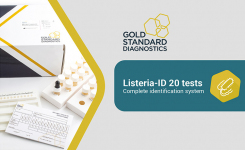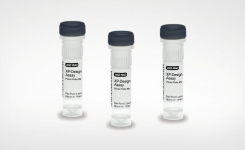On-demand molecular test detects and differentiates the genes encoding the most prevalent carbapenemases: KPC, NDM, VIM, OXA-48 and IMP-1
Cepheid have released the Xpert® Carba-R, an on-demand molecular test for rapid and accurate detection of carbapenemase-producing Gram-negative bacteria, to be marketed as a CE IVD product under the European Directive on In Vitro Diagnostic Medical Devices. The test runs on Cepheid's GeneXpert® System, a molecular diagnostic platform. Xpert Carba-R detects and differentiates genes encoding the most prevalent carbapenemases — reporting five gene families that comprise 68 known individual resistance genes, including KPC, NDM, VIM, OXA-48 and IMP-1.
"Carbapenemase-producing organisms were named for their ability to fight off carbapenem antibiotics — the last line of defense in our medical toolbox," said John Bishop, Cepheid's Chairman and Chief Executive Officer. "Xpert Carba-R provides healthcare institutions a much-needed tool for rapid and accurate detection of patients colonized with these multidrug resistant organisms to help prevent widespread outbreaks and determine the best infection prevention pathways."
Carbapenemase-producing (resistant) organisms, or CROs, include the Enterobacteriaceae, which is a family of bacteria that normally live in the digestive system, including organisms such as Klebsiella pneumoniae and Escherichia coli. They are part of normal human gut bacteria. However, carbapenemase producers also include Pseudomonas aeruginosa, Acinetobacter baumannii, and a variety of other healthcare-associated pathogens that have become resistant to the antibiotics known as carbapenems. Carbapenems are often referred to as the antibiotics of last-resort and are usually reserved for severe life-threatening infections caused by multidrug resistant organisms. All of these organisms are capable of harboring and spreading these carbapenem resistance genes.
"Detection of patients carrying carbapenemase-producing microorganisms, with differentiation among the five major families of resistance genes, can significantly impact infection control. With results in less than an hour, we have the advantage of rapid implementation of epidemiological measures to control the spread of these microorganisms," said Dr. Rafael Canton, Professor of Microbiology at the Hospital Universitario Ramon y Cajal, Madrid, Spain.
Carbapenemases of global importance include Klebsiella pneumonia carbapenemase (KPC), New Delhi metallo-β-lactamase (NDM), Verona integron-encoded metallo-β-lactamase (VIM), imipenemase metallo-β-lactamase (IMP), and oxacillinase-48 (OXA-48). As of 2014, KPC is the most widespread carbapenemase in the United States1 while OXA-48 is becoming the most important one in most European countries2.
"Like our other GeneXpert cartridges, Xpert Carba-R can be performed on a STAT basis — no waiting for batched results. Rapid identification of colonized patients allows healthcare institutions to begin immediate implementation of infection control measures to prevent spread in highly susceptible populations," said David Persing, M.D., Ph.D., Cepheid's Chief Medical and Technology Officer. "Active screening of high risk patients has the additional benefit of allowing clinicians to optimize isolation decisions and avoid the impact of unnecessary isolations."
- 1 - http://www.cdc.gov/hai/organisms/cre/
- 2 - http://www.ecdc.europa.eu/en/publications/Publications/antimicrobial-resistance-carbapenemase-producing-bacteria-europe.pdf























